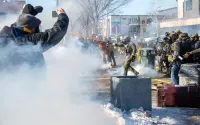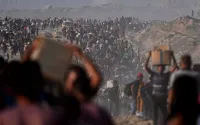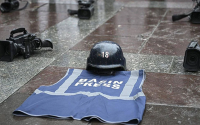Democracy Now! airs rare footage of John Bolton speaking on Feb. 3, 1994 in New York criticizing the United Nations. "The Secretariat building in New York has 38 stories," Bolton said. "If it lost ten stories, it wouldn't make a bit of difference." Meanwhile, 59 former diplomats have written an open letter criticizing his nomination. [includes rush transcript]
The Los Angeles Times is reporting that every Democrat on the Senate Foreign Relations Committee plans to reject John Bolton's nomination to be US ambassador to the United Nations. This would mark the first time that committee Democrats unanimously opposed a diplomatic selection by President Bush. It could also put Bush's nomination in peril if any Republicans defected to vote against Bolton. Several groups opposed to Bolton have launched campaigns to urge Republican Lincoln Chafee of Rhode Island to vote against his nomination. Chafee is the most moderate Republican on the Foreign Relations Committee.
Meanwhile, a group of former U.S. diplomats and other high level officials have called for the Senate to reject John Bolton's nomination to become the next U.S. ambassador to the United Nations. 59 former diplomats and other officials have signed an open letter outlining their views to Senator Richard Lugar. Lugar is the chair of the Senate Foreign Relations Committee which will hold hearings on Bolton's nomination on April 7. Bolton has been one of the fiercest critics of the United Nations within the Bush administration. The letter to Senator Lugar states that Bolton "is the wrong man for this position" and cites Bolton's insistence that the U.N. is valuable only when it directly serves the United States- as cause for concern. That view, they stated, would undermine negotiation efforts with other diplomats at the U.N. At the announcement of Bolton's nomination on March 7th, Secretary of State Condoleezza Rice described him as "a tough-minded diplomat" with "a proven track record of effective multilateralism."
We are joined in the studio by one of the people who signed the letter to Senator Lugar, Spurgeon Keeny. We are also joined by Don Kraus who is the Executive Vice President of Citizens for Global Solutions. They have just released footage of John Bolton from more than 10 years ago where he was speaking at an event called the "Global Structures Convocation," held on February 3, 1994 in New York.
John Bolton, speaking in New York on Feb. 3, 1994 in New York. Spurgeon Keeny Jr., former deputy director of the U.S Arms Control and Disarmament agency under President Carter 1976-1981. He was one of the 59 who signed a letter to Senator Lugar urging the rejection of John Bolton as U.S Ambassador to the U.N. Don Kraus, Executive Vice President of Citizens for Global Solutions. The organization recently launched the website StopBolton.org.
AMY GOODMAN: We're joined in the studio by one of the people who signed the letter to Senator Lugar, Spurgeon Keeny. We are also joined by Don Kraus, Executive Vice President of Citizens for Global Solutions. They have just released footage of John Bolton from more than 10 years ago, where he was speaking at an event called "The Global Structures Convocation." It was held on February 3, 1994, in New York. Here is some of what John Bolton had to say.
JOHN BOLTON: The point that I want to leave with you in this very brief presentation is where I started, is that there is no United Nations. There is an international community that occasionally can be led by the only real power left in the world, and that's the United States, when it suits our interest, and when we can get others to go along. And I think it would be a real mistake to count on the United Nations as if it is some disembodied entity out there that can function on its own.
AMY GOODMAN: That was President Bush's nominee for UN Ambassador, John Bolton, speaking on February 3, 1994. Here is another clip from that event.
JOHN BOLTON: The League of Nations was a failure because the United States did not participate. The United Nations would be a failure if the United States did not participate and, in fact, I remember as vividly as though it were yesterday, right after Iraq invaded Kuwait, Jim Baker said to me, we're going to make this United Nations work, or we're going to find out whether it is the League Nations or the UN. And that's the fact. And if you don't like it, then I'm sorry. The United States makes the UN work when it wants it to work, and that is exactly the way it should be, because the only question, the only question for the United States is what is in our national interest. And if you don't like that, I'm sorry, but that is the fact.
AMY GOODMAN: This tape of John Bolton was released this week by Citizens for Global Solutions. Here is one more excerpt from that event more than a decade ago.
JOHN BOLTON: If you think that there is any possibility in this country that a 51,000 person bureaucracy is going to be supported by most Americans, you better think again. The Secretariat Building in New York has 38 stories. If you lost 10 stories today it wouldn't make a bit of difference. The United Nations is one of the most inefficient inter-governmental organizations going. UNESCO is even worse. And others go down hill from there. The fact of the matter is that the international system that has grown up, and again, I leave out the World Bank and the IMF because I do think that they're in a separate category, has been put into a position of hiring ineffective people who do ineffective things that have no real world impact, and we pay 25% of the budget.
AMY GOODMAN: We're joined in our studio by two guests. That, by the way, John Bolton. Don Kraus is the Executive Vice President of Citizens for Global Solutions, part of the group that organized the meeting from which we just saw and heard clips. And Spurgeon Keeny, Jr. He's former Deputy Director of the US Arms Control and Disarmament Agency under President Carter. He was one of the 59 who signed a letter to Senator Lugar urging the rejection of John Bolton as US Ambassador to the United Nations. And we welcome you both to Democracy Now!
DON KRAUS: Glad to be here.
AMY GOODMAN: First, let's start with Spurgeon Keeny, this letter. Explain why you signed on to it.
SPURGEON KEENY, JR.: I think the best explanation why 59 nonpartisan ambassadors and former officials signed on to this letter is given in the words we have just heard from John Bolton himself. For years John Bolton has attacked and mocked the United Nations, and opposed most of the positive activities in arms control and related activities that have been supported by the vast majority of the members of the United Nations. He has made a career of opposing multilateral approaches to international affairs, and in total disregard to the opinions of others and championed the notion that US foreign policy should be based on a unilateral basis. In fact, he has become the symbol of the American unilateralist. I think it was felt by all the signers of this letter that it was most unfortunate that his nomination should be put forth at the time that President Bush apparently is making an effort to improve the US image abroad and to rebuild relations with the United Nations. I think that it was felt by this very diverse group of former diplomats that John Bolton was the worst possible nomination to represent to the United States before the world community at the United Nations.
AMY GOODMAN: Don Kraus, these clips that we have just heard and watched, we've heard some of these quotes before. But we haven't actually seen John Bolton saying them. Can you talk about their significance?
DON KRAUS: They're significant because it is clear that John Bolton is vehement in his feelings about -- that the US should operate unilaterally. Any man who says that there should be one permanent member on the Security Council, and that should be the United States, clearly is not the right choice for our ambassador to the UN, particularly in this year, which is a vitally important year for rebuilding the UN for the 21st century. But letting this man in is letting the fox into the hen house. He has the wrong ideas, the wrong message, and the wrong choice. That's why we have set up stopbolton.org, so Americans can see these clips themselves, and they can make sure that their senators see these clips themselves.
AMY GOODMAN: What about the latest developments, hearing all the Democrats are going to oppose John Bolton? And now it would take a Republican joining them.
DON KRAUS: It's really not a Democrat or Republican issue. It is a question of reasonable senators looking at the information, looking at the evidence, and making the decision that this person should not represent us. We're very, very close. We only need a few more senators to agree to hold back on this nomination. There's many good diplomats and there's many good people within the Bush administration that would really support President Bush's current push for better multilateral engagement. This is not the right guy to do the job.
AMY GOODMAN: Spurgeon Keeny, in the letter that you signed to Senator Lugar, it says, "John Bolton has an exceptional record of opposition to efforts to enhance US security through arms control. He led a campaign against ratification of the Comprehensive Nuclear Test Ban Treaty. Today, the administration is pressing for development of new types of nuclear weapons. John Bolton blocked more extensive international agreement to limit sales of small arms, the main killer in internal wars." What about this issue of the Nuclear Test Ban Treaty?
SPURGEON KEENY, JR.: John Bolton has been extremely up front on that issue. Of course, it is the policy of this administration not to ratify the treaty. But we still operate under it. And I understand that Bolton would favor withdrawing our signature from the Test Ban Treaty as he has other agreements, as well. And this would be a tremendously dangerous precedent for the United States to set, precisely at the time that we're trying to encourage other countries not to withdraw from the Non-Proliferation Treaty, for the United States to set the example by withdrawing from the Comprehensive Test Ban, which was signed and initiated by the United States. It sets exactly the wrong note.
AMY GOODMAN: The letter also says, "John Bolton crafted the US withdrawal from the joint efforts of 40 countries to formulate a verification system for biological weapons convention, and blocked continuation of these efforts in a period of increasing concern over potential terrorist use of these weapons and of terrorist access to the stocks of countries covertly producing these weapons."
SPURGEON KEENY, JR.: Well, that is correct and, I think, has sort of amazed the rest of the world, because the United States has always been out front insisting on verification, and Reagan made the famous remark, "Trust, but verify." John Bolton has been in the forefront of those who don't seem to want any verification for agreements. And I think it is basically because they want total flexibility for the United States to do whatever it wishes, and that is more important to them than trying to control the activities of other countries that might endanger our security and world security. I mean, it is significant that he played a lead role in US withdrawal from the ABM Treaty, which was negotiated and ratified almost unanimously by the US Senate under President Nixon and was considered a foundation to our whole strategic arms control posture. He took a leading role in our withdrawal from that treaty a year or two ago, simply because it was felt politically desirable to initiate a ballistic missile defense, a defense which is technically a total failure and will result in expenditure of hundreds of billions of dollars and contribute not a thing to the concern of the war against terrorism. So he has a rather contrarian view about the whole field of arms control, in being basically opposed to it because it limits the flexibility of the United States as a unilateral power.
AMY GOODMAN: Don Kraus, finally, as we wrap up the discussion, the US ambassador to the United Nations, whoever that person is, is basically carrying out just the wishes of the Bush Administration. So does it really matter who it is?
DON KRAUS: It certainly does matter who it is for a number of reasons. This year in September is the 60th anniversary of the UN. There is a summit of world leaders coming together to try to work out how does the UN become a relevant, effective organization for the 21st century. There is a number of very good proposals on the table. If you have a diplomat that can build coalition, that could forge consensus there at the UN, we can move forward and make this work. If you have someone whose goal is to not reform the UN, but resign the UN, retire the UN, that is not going to work. Yet John Bolton said the happiest moment of his life was when he got to bring the paper unsigning the US commitment to International Criminal Court treaty. He said it was the happiest moment in his government service. Today the Security Council is supposed to vote on a resolution referring the genocide in Darfur to the International Criminal Court. Our understanding is there is a strong possibility the US won't veto this, but rather they'll abstain and allow it to go forward. With John Bolton as US ambassador, there is no way that this action would ever happen. We can't let this fox into the hen house. We need to be able to stop it.
AMY GOODMAN: Last words, Spurgeon Keeny.
SPURGEON KEENY, JR.: I would like to endorse what was just said. It's true that an ambassador has to follow his instructions, and many of the things John Bolton said appear to be the policies of the Bush Administration. However, an ambassador has much opportunity, particularly at the UN, to operate on his own when there is not a specific issue at hand. And John Bolton will be seen as the symbol of US unilateralism and of opposition to the United Nations. And I think that his activities, not just in the voting but in the day-to-day activities at the UN, would be most disadvantageous to US position in the eyes of the world and to the evolution of the more effective United Nations.
AMY GOODMAN: I want to thank you both very much for joining us. Former Deputy Director of the US Arms Control and Disarmament Agency under President Carter, 1976 to 1981, Spurgeon Keeny, the Honorable. Thank you. And Don Kraus, Executive Vice President of Citizens for Global Solutions. Your website again?
DON KRAUS: It's stopbolton.org.






